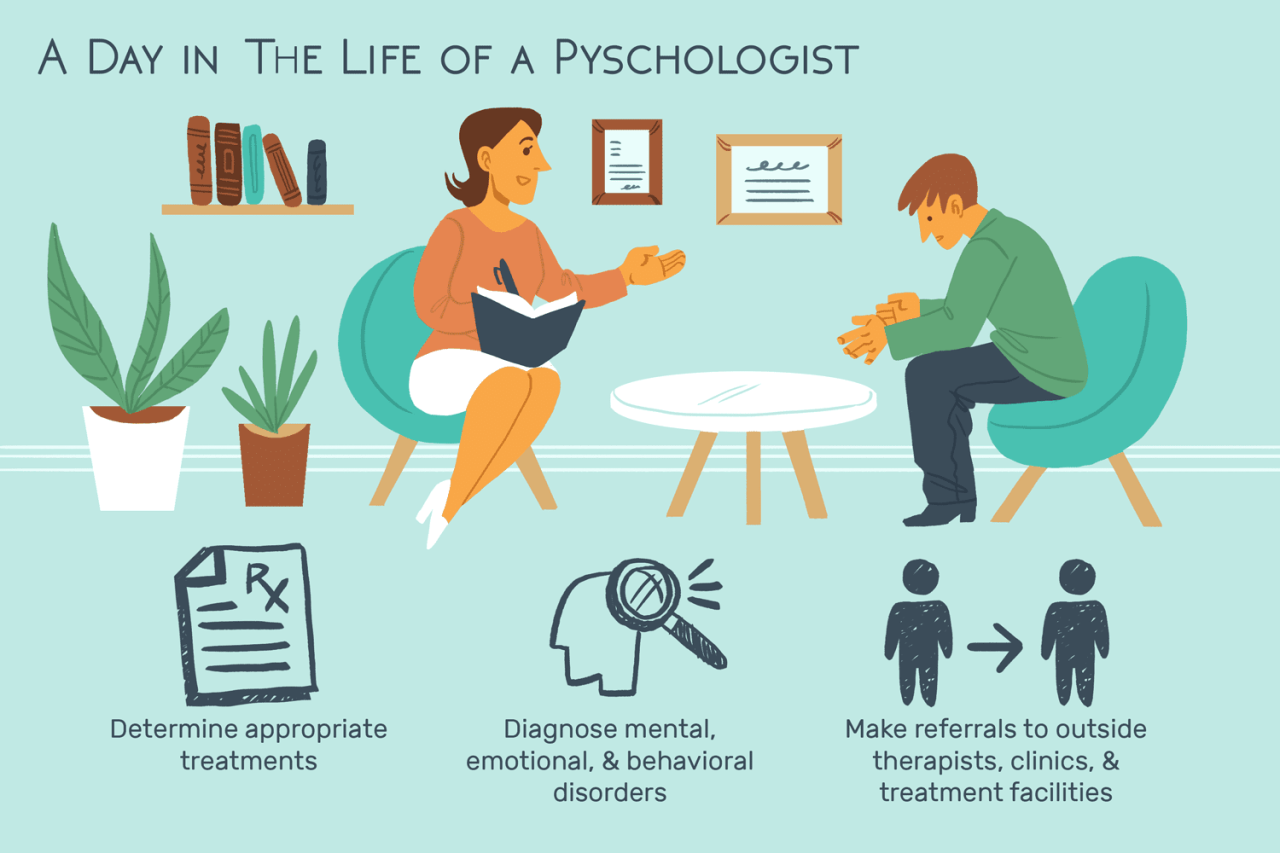
What can you do with a bachelor’s degree in psychology? This question often arises for students seeking a path beyond the traditional clinical or research roles. A psychology degree offers a versatile skillset that extends far beyond the confines of a therapist’s office. It equips graduates with the ability to analyze human behavior, understand motivations, and solve complex problems – skills valuable across a wide range of industries.
From understanding consumer behavior in marketing to navigating interpersonal dynamics in human resources, psychology graduates find their knowledge applicable in diverse fields. The study of human behavior provides a unique perspective that can be applied to everything from improving workplace productivity to designing user-friendly technology.
Career Paths with a Psychology Degree: What Can You Do With A Bachelor’s Degree In Psychology
A bachelor’s degree in psychology opens doors to a wide range of career paths, both traditional and emerging. The field’s focus on human behavior, cognition, and well-being equips graduates with valuable skills applicable to diverse industries.
Traditional Career Paths
A psychology degree serves as a foundation for traditional career paths in mental health and research. These roles often require additional education and licensure.
- Clinical Psychology: Clinical psychologists are trained to diagnose and treat mental health disorders. They provide therapy, conduct assessments, and develop treatment plans. To become a licensed clinical psychologist, a doctoral degree (PhD or PsyD) and supervised clinical experience are required.
- Counseling: Counselors work with individuals, families, and groups to address personal, social, and emotional challenges. They provide guidance, support, and coping strategies. Counseling specialties include marriage and family counseling, school counseling, and substance abuse counseling. Licensure requirements vary by state.
- Research: Psychology researchers study human behavior and mental processes through scientific methods. They design and conduct experiments, analyze data, and publish their findings in academic journals. Research positions are often found in universities, research institutions, and government agencies.
Emerging Career Paths
Psychology graduates are increasingly finding opportunities in fields beyond traditional mental health settings. Their skills in communication, problem-solving, and understanding human behavior are highly valued in these emerging roles.
- Human Resources: Psychology graduates can contribute to HR departments by applying their knowledge of motivation, teamwork, and employee well-being. They can assist with recruitment, training, performance management, and employee relations.
- Marketing: Understanding consumer behavior is crucial for successful marketing campaigns. Psychology graduates can analyze market research, develop marketing strategies, and design advertising campaigns that resonate with target audiences.
- Data Analysis: The ability to analyze data and interpret trends is essential in today’s data-driven world. Psychology graduates with research experience are well-suited for roles in data analysis, where they can apply statistical skills to understand human behavior patterns.
Unconventional Career Paths
Many psychology graduates have successfully pursued careers outside traditional fields, leveraging their unique skills and knowledge.
“My psychology degree helped me understand the complexities of human behavior, which is invaluable in my role as a product manager. I can empathize with users and design products that meet their needs.” – Sarah, Product Manager at a Tech Company
- User Experience (UX) Design: UX designers focus on creating user-friendly and intuitive interfaces for websites, apps, and other digital products. A psychology background helps them understand user needs, preferences, and behaviors, leading to better design outcomes.
- Sales and Business Development: Psychology graduates can excel in sales and business development roles, where they can build rapport, understand customer motivations, and negotiate effectively. Their communication and interpersonal skills are valuable assets in these fields.
- Journalism and Writing: A psychology degree can provide a strong foundation for careers in journalism and writing, particularly in areas like health, social issues, and human behavior. The ability to analyze information, conduct interviews, and communicate complex concepts effectively is essential in these roles.
Skills and Knowledge Gained

A bachelor’s degree in psychology equips you with a unique blend of skills and knowledge that are highly valued across various industries. You’ll gain a comprehensive understanding of human behavior, cognitive processes, and development, coupled with practical skills in research, analysis, and communication.
Critical Thinking and Problem-Solving
Critical thinking is the foundation of psychology. You’ll learn to analyze information, identify biases, and develop logical arguments. This skill is essential for making informed decisions, evaluating evidence, and solving complex problems. For example, in marketing, a psychology graduate can use critical thinking to analyze consumer behavior and identify effective marketing strategies.
Communication Skills
Psychology emphasizes clear and effective communication. You’ll learn to articulate complex ideas, present research findings, and engage in meaningful conversations. This skill is valuable in various roles, from conducting research presentations to leading team meetings. For instance, a psychologist working in a healthcare setting must effectively communicate with patients, their families, and other healthcare professionals.
Research Methods
Psychology is a scientific discipline, and you’ll learn to conduct research, collect data, and analyze results. This involves understanding research designs, statistical analysis, and ethical considerations. These skills are applicable in research-intensive fields like academia, market research, and policy analysis. For example, a researcher in a pharmaceutical company can utilize research methods to design and conduct clinical trials for new drugs.
Understanding Human Behavior
Psychology provides a deep understanding of human behavior, motivations, and emotions. You’ll learn about various psychological theories, including personality, social psychology, and developmental psychology. This knowledge is valuable in fields like human resources, marketing, and education, where understanding human behavior is critical. For instance, a human resources professional can use their knowledge of human behavior to create effective recruitment strategies and improve employee engagement.
Cognitive Processes
Psychology explores how people think, learn, and remember. You’ll gain insights into cognitive processes like attention, memory, and decision-making. This knowledge is applicable in fields like education, design, and technology, where understanding how people process information is crucial. For example, a user experience (UX) designer can use their understanding of cognitive processes to create intuitive and user-friendly interfaces.
Further Education and Specialization
A bachelor’s degree in psychology can open doors to various career paths, but for those seeking specialized roles or advanced research opportunities, further education is often necessary. Graduate degrees in psychology provide in-depth knowledge and practical skills, preparing individuals for leadership positions in research, clinical practice, and various other fields.
Master’s Degree Options
A master’s degree in psychology offers a deeper understanding of psychological theories and principles, along with specialized training in a specific area of interest. Here are some popular master’s degree options:
- Clinical Psychology: This program focuses on the diagnosis, treatment, and prevention of mental health disorders. Graduates are often eligible for licensure as psychologists and can work in hospitals, clinics, and private practices.
- Counseling Psychology: This specialization emphasizes the development of therapeutic skills and techniques to help individuals address personal, social, and career challenges. Graduates may work in schools, community organizations, and private practices.
- Industrial-Organizational Psychology: This program focuses on applying psychological principles to workplace settings. Graduates work in organizations to improve employee morale, productivity, and overall organizational effectiveness.
- School Psychology: This specialization combines psychology and education to address the academic, social, and emotional needs of students. Graduates work in schools, providing assessment, counseling, and intervention services.
Doctoral Degree in Psychology (PhD)
A PhD in psychology is the highest level of education in the field and prepares individuals for research and teaching positions in academia, government, and private organizations. It involves rigorous coursework, research, and dissertation writing.
A PhD in psychology can open doors to prestigious research institutions, universities, and government agencies, enabling individuals to contribute to the advancement of psychological knowledge and its application in various settings.
Choosing a Specialization
Choosing a specialization in psychology is a crucial step, as it determines the direction of your career path. Consider your personal interests, skills, and career goals when making this decision.
- Personal Interests: Explore areas of psychology that genuinely intrigue you. Are you passionate about understanding human behavior, helping others, or applying psychology to solve organizational challenges?
- Skills and Abilities: Reflect on your strengths and weaknesses. Do you excel in research, communication, or working with people?
- Career Goals: What are your long-term aspirations? Do you envision yourself working in academia, clinical practice, or a corporate setting?
Industry Applications of Psychology
Psychology is not just a field of study confined to academic halls and research labs. It has far-reaching applications in various industries, influencing how we work, interact, and make decisions. This section explores the diverse ways psychology principles are utilized in different professional settings.
Industries and Roles
Psychology graduates are employed in a wide range of industries, each requiring a unique set of skills and knowledge. The table below Artikels some common industries and the specific roles psychology graduates often fill:
| Industry | Roles |
|---|---|
| Human Resources | Employee Selection and Training, Performance Management, Organizational Development, Employee Relations, Talent Acquisition, Diversity and Inclusion |
| Marketing | Market Research, Consumer Behavior Analysis, Advertising and Promotion, Brand Management, Customer Relationship Management |
| Healthcare | Clinical Psychology, Counseling, Psychotherapy, Health Education, Rehabilitation, Geriatric Care, Public Health |
| Education | School Psychology, Educational Psychology, Teacher Training, Curriculum Development, Special Education, Educational Assessment |
| Law | Forensic Psychology, Legal Psychology, Criminal Profiling, Witness Testimony Analysis, Jury Selection, Law Enforcement Training |
| Business | Organizational Behavior, Leadership Development, Change Management, Team Building, Conflict Resolution, Negotiation |
| Technology | User Experience (UX) Design, Human-Computer Interaction, Accessibility, Gamification, Artificial Intelligence |
| Government | Policy Analysis, Public Health, Social Services, Criminal Justice, Public Safety, National Security |
Applications in Human Resources, What can you do with a bachelor’s degree in psychology
Psychology plays a crucial role in optimizing human capital within organizations. HR professionals leverage psychological principles to understand employee motivation, improve performance, and foster a positive work environment.
* Employee Selection and Training: Psychological assessments, such as personality tests and aptitude tests, help identify candidates with the skills and traits required for specific roles. Training programs are designed based on learning theories and principles to maximize knowledge retention and skill development.
* Performance Management: Psychological insights into employee motivation and job satisfaction are used to design performance management systems that are fair, effective, and motivating.
* Organizational Development: Psychologists contribute to organizational development initiatives by analyzing organizational culture, improving communication, and fostering teamwork.
Example: A large tech company used psychological assessments to select candidates for a new software development team. The company focused on identifying individuals with high cognitive abilities, strong problem-solving skills, and a collaborative work style. This approach resulted in a highly effective team that consistently exceeded performance expectations.
Applications in Marketing
Psychology is fundamental to understanding consumer behavior and influencing purchasing decisions. Marketers utilize psychological principles to create effective advertising campaigns, develop compelling brand narratives, and tailor products and services to specific customer needs.
* Market Research: Psychological research methods are used to understand consumer preferences, attitudes, and motivations. This data informs product development, marketing strategies, and advertising campaigns.
* Consumer Behavior Analysis: Marketers study psychological factors that influence consumer choices, such as social influence, cognitive biases, and emotional responses. This understanding allows them to design products and messages that resonate with specific target audiences.
* Advertising and Promotion: Advertising campaigns are designed to evoke specific emotions, trigger cognitive processes, and create positive associations with brands. Psychological principles are used to create memorable and impactful advertising messages.
Example: A beverage company used a psychological study to identify the emotional triggers that drive consumer preference for their product. The study revealed that consumers associated the beverage with feelings of happiness and relaxation. The company then used this insight to develop an advertising campaign that emphasized these emotional connections, leading to a significant increase in sales.
Applications in Healthcare
Psychology plays a vital role in promoting mental and physical well-being. Psychologists provide therapeutic services, conduct research, and contribute to public health initiatives.
* Clinical Psychology: Clinical psychologists diagnose and treat mental health disorders, provide therapy, and conduct psychological assessments. They work in hospitals, clinics, private practices, and community mental health centers.
* Counseling: Counselors provide guidance and support to individuals facing personal, social, or emotional challenges. They work in schools, universities, community organizations, and private practices.
* Health Education: Psychologists develop and implement health education programs to promote healthy behaviors, prevent disease, and improve overall well-being.
Example: A hospital implemented a stress management program for patients with chronic pain. The program incorporated mindfulness techniques and relaxation exercises, which were based on psychological principles of stress reduction. The program resulted in significant improvements in patient well-being and reduced reliance on pain medication.
Applications in Education
Educational psychology is a specialized field that applies psychological principles to understand learning, teaching, and educational processes. Psychologists in education work to improve student learning outcomes, support teacher development, and create inclusive learning environments.
* School Psychology: School psychologists provide psychological services to students, teachers, and families. They conduct assessments, provide counseling, and develop interventions to address academic, behavioral, and emotional challenges.
* Educational Psychology: Educational psychologists research and apply psychological principles to improve teaching methods, curriculum design, and classroom management.
* Teacher Training: Psychology plays a crucial role in training teachers to understand student learning styles, create engaging learning environments, and effectively manage classroom behavior.
Example: A school district implemented a new reading intervention program based on principles of cognitive psychology. The program emphasized phonemic awareness, phonics instruction, and fluency development. The program resulted in significant improvements in student reading skills and reduced the number of students requiring special education services.
Applications in Law
Forensic psychology is a specialized field that applies psychological principles to legal issues. Forensic psychologists work in the criminal justice system, providing expertise on criminal behavior, witness testimony, and jury selection.
* Forensic Psychology: Forensic psychologists assess criminal offenders, evaluate witness credibility, and provide expert testimony in court. They may also conduct risk assessments to predict future criminal behavior.
* Legal Psychology: Legal psychologists study the psychological factors that influence legal decision-making, such as jury behavior, eyewitness testimony, and the impact of legal procedures on individuals.
* Criminal Profiling: Criminal profilers use psychological principles to develop profiles of unknown offenders based on crime scene evidence and other available information.
Example: A forensic psychologist was called upon to evaluate the credibility of a witness in a criminal trial. The psychologist used their expertise in eyewitness memory and perception to assess the reliability of the witness’s testimony. The psychologist’s testimony helped the jury to reach a fair and just verdict.
Personal Growth and Development

A psychology degree offers a unique opportunity for personal growth and development, equipping individuals with a deeper understanding of themselves and others. By exploring the complexities of human behavior, thought processes, and emotions, psychology provides a framework for self-reflection, improved communication, and enhanced emotional intelligence.
The Impact of Psychology on Personal Growth
Psychology provides a lens through which individuals can examine their own thoughts, feelings, and behaviors. By understanding psychological concepts such as cognitive biases, defense mechanisms, and personality theories, individuals can gain valuable insights into their own patterns of thinking and acting. This self-awareness can empower them to make conscious choices that align with their values and goals, leading to greater personal fulfillment.
Enhanced Communication Skills
Psychology emphasizes the importance of effective communication in building strong relationships and navigating interpersonal challenges. Through coursework in communication psychology, individuals learn about verbal and nonverbal communication, active listening, conflict resolution, and empathy. This knowledge enhances their ability to express themselves clearly, understand others’ perspectives, and build rapport, fostering healthier and more fulfilling relationships.
Increased Emotional Intelligence
Emotional intelligence (EQ) is a crucial aspect of personal growth and success. Psychology helps individuals develop their EQ by providing insights into the nature of emotions, the impact of emotions on behavior, and strategies for managing emotions effectively. Through the study of emotional regulation, stress management, and interpersonal skills, individuals can learn to identify, understand, and manage their own emotions, as well as those of others.
Applying Psychology to Personal Challenges
Psychology offers a toolbox of strategies and techniques that can be applied to address personal challenges. For example, individuals struggling with anxiety or depression may find relief through cognitive behavioral therapy (CBT), a therapeutic approach that focuses on identifying and modifying negative thought patterns. Others may benefit from mindfulness practices, which can help reduce stress and promote emotional well-being.
Lifelong Learning in Psychology
The field of psychology is constantly evolving, with new research and discoveries emerging regularly. Staying updated on current trends and advancements is crucial for both professional and personal growth. Individuals can engage in lifelong learning through reading psychology journals, attending conferences, and participating in online courses. This ongoing pursuit of knowledge ensures that they remain informed and equipped to navigate the complexities of human behavior and apply psychological insights to their lives.
Last Recap

A bachelor’s degree in psychology opens doors to a world of possibilities. Whether you choose to pursue a traditional career path in mental health or explore a less conventional route, the skills and knowledge gained will serve you well. By understanding the human mind and its complexities, you can make a meaningful impact on individuals, organizations, and society as a whole. The field of psychology is constantly evolving, and a degree in this discipline provides a solid foundation for a fulfilling and rewarding career.
Essential Questionnaire
What are some common misconceptions about a psychology degree?
One common misconception is that a psychology degree only prepares you for a career as a therapist. While clinical psychology is a popular path, a psychology degree opens doors to a wide range of fields.
Is a psychology degree useful for business careers?
Absolutely! Psychology graduates are highly sought after in business due to their understanding of human behavior, communication, and decision-making. They can excel in roles like market research, human resources, and sales.
Can I work in technology with a psychology degree?
Yes! Psychology graduates are increasingly finding their way into the tech industry. Their skills in user research, design thinking, and understanding user behavior are valuable assets for companies developing innovative products and services.




